Related Research Articles
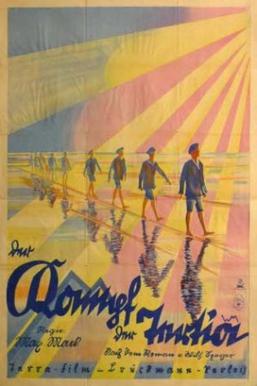
Fight of the Tertia is a 1929 German silent family film directed by Max Mack and starring Max Schreck, Fritz Richard and Fritz Greiner. It is based on the 1928 novel of the same name by Wilhelm Speyer which was later adapted into a 1952 sound film. It was shot at the Terra Studios in Berlin and on location in Friedrichstadt and in the North Sea. The film's art direction was by Hans Jacoby.

William Tell is a 1923 German silent adventure film directed by Rudolf Dworsky and Rudolf Walther-Fein and starring Hans Marr, Conrad Veidt, and Erich Kaiser-Titz. The film portrays the story of the legendary Swiss national hero William Tell. The sets were designed by Rudi Feld. It premiered at the Marmorhaus in Berlin.
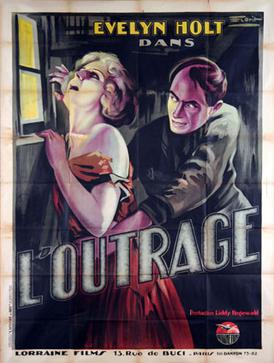
The Scoundrel is a 1931 German comedy film directed by Eugen Schüfftan and Franz Wenzler and starring Max Adalbert, Emilia Unda, and Evelyn Holt. It is based on the play The Scoundrel by Hans Reimann and Toni Impekoven. It was shot at the Babelsberg Studios in Berlin with sets designed by the art directors Hans Sohnle and Otto Erdmann. The film was remade in 1939 and 1959.
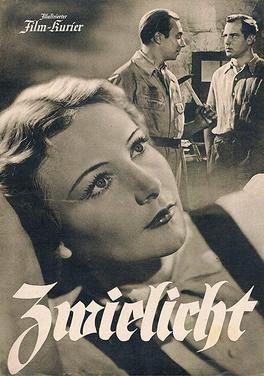
Twilight is a 1940 German drama film directed by Rudolf van der Noss and starring Viktor Staal, Ruth Hellberg and Carl Raddatz. The film's art direction was by Hermann Asmus and Carl Ludwig Kirmse.

Knockout is a 1935 German sports film directed by Carl Lamac and Hans H. Zerlett and starring Anny Ondra, Max Schmeling, and Hans Schönrath. After impressing a boxing trainer during a brawl over a woman, a young man is recruited and trained to be a boxer. He fights and defeats the British champion.

The Lady with the Mask is a 1928 German silent film directed by Wilhelm Thiele and starring Max Gülstorff, Arlette Marchal and Vladimir Gajdarov. It was shot at the Babelsberg Studios in Berlin. The film's sets were designed by the art director Erich Czerwonski.
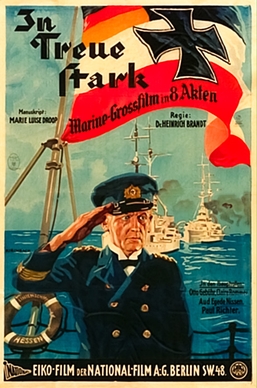
Eternal Allegiance is a 1926 German silent drama film directed by Heinrich Brandt and starring Otto Gebühr, Claire Rommer, and Paul Richter. It was shot at the National Studios in Berlin. The film's sets were designed by the art director Max Knaake.

Struggle for the Soil is a 1925 German silent film directed by Erich Waschneck and starring Gustav Oberg, Ferdinand von Alten, and Oskar Marion. It is based on the classic novel From My Farming Days by Fritz Reuter.

Two Good Comrades is a 1933 German war comedy film directed by Max Obal and starring Paul Hörbiger, Fritz Kampers, and Jessie Vihrog.
The Love of the Brothers Rott is a 1929 German silent film directed by Erich Waschneck and starring Olga Chekhova, Jean Dax and Paul Henckels. It was shot at the Staaken Studios in Berlin. The film's sets were designed by the art director Andrej Andrejew.

Regine is a 1935 German drama film directed by Erich Waschneck and starring Luise Ullrich, Anton Walbrook and Olga Chekhova. It was shot at the Grunewald Studios in Berlin. The film's sets were designed by Otto Erdmann and Hans Sohnle.
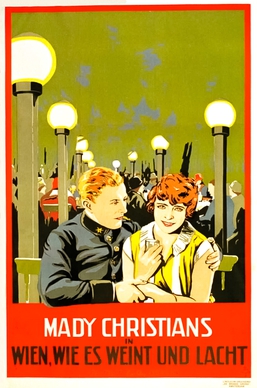
Vienna, How it Cries and Laughs is a 1926 German silent film directed by Rudolf Walther-Fein and Rudolf Dworsky and starring Fritz Greiner, John Mylong, and Mady Christians.

Hans in Every Street is a 1930 German crime film directed by Carl Froelich and starring Hans Albers, Camilla Horn, and Betty Amann. A separate French-language version was also released.

Klettermaxe is a 1927 German silent crime film directed by Willy Reiber and starring Dorothea Wieck, Corry Bell and Paul Heidemann. The story was remade as a sound film in 1952.

Holiday From Myself is a 1934 German comedy film directed by Hans Deppe and starring Hermann Speelmans, Carola Höhn, and Georg H. Schnell.
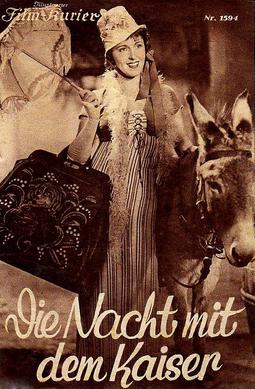
The Night With the Emperor is a 1936 German historical comedy film directed by Erich Engel and starring Jenny Jugo, Richard Romanowsky, and Friedrich Benfer. It was shot at the Johannisthal Studios of Tobis Film in Berlin. The film's sets were designed by the art directors Karl Haacker and Hermann Warm. The film is set in 1808 at the Congress of Erfurt.

Sacred Lie is a 1955 West German drama film directed by Wolfgang Liebeneiner and starring Ulla Jacobsson, Karlheinz Böhm and Erwin Strahl. It was shot at the Tempelhof Studios in Berlin. The film's sets were designed by the art directors Ernst Richter and Hans Ledersteger.

The Battle of Bademunde is a 1931 German comedy film directed by Philipp Lothar Mayring and starring Max Adalbert, Claire Rommer and Paul Wagner. It was one of a number of military comedies made during the late Weimar era. It was shot at the Babelsberg Studios in Berlin. The film's sets were designed by the art director Artur Günther. It was produced and distributed by UFA, Germanys largest film company of the era.
The Love Nest is a 1922 German silent film directed by Rudolf Walther-Fein and starring Paul Wegener, Reinhold Schünzel, and Lyda Salmonova. It was released in two parts.

In the Name of the People is a 1939 German crime film directed by Erich Engels and starring Rudolf Fernau, Fritz Kampers, and Rolf Weih. The film's sets were designed by the art directors Hans Sohnle and Wilhelm Vorwerg. It was shot at the Babelsberg Studios in Berlin.
References
- ↑ Bock & Bergfelder p.193